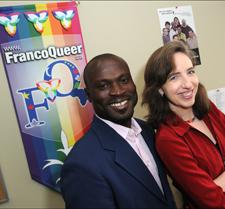FrancoQueer, a Toronto-based organization for French-speaking queers, has partnered with the AIDS Committee of Toronto (ACT) to offer a new HIV initiative for francophones.
“There are not many services available in French for PHAs [people living with HIV/AIDS],” says Jean-Rock Boutin, FrancoQueer’s cofounder and board chair. “In fact, none of the mainstream HIV/AIDS organizations were providing services in French. The only one that was providing any French services was CATIE [the Canadian AIDS Treatment Information Exchange] and they only provided information, not treatment itself.
“Also we are seeing many newcomers, especially those from African, Caribbean and European countries, who don’t speak English. These people need these services.”
The project has received a one-year start-up grant of $150,000 from the provincial ministry of health’s AIDS Bureau, which has allowed FrancoQueer to hire two project coordinators.
“This is the first time that they got funding to hire people like us,” says project coordinator Sharon Love. “[Fellow coordinator] Carlos Idibouo and I started in August. We have a number of activities devel-oped that are for the LGBT community in general and then we have the support groups which are especially for gay men with HIV.”
In addition to social and educational events the project will include a self-help group for francophones living with HIV that will encourage members to network with each other to access additional available services.
Boutin says HIV-positive francophones have long been deprived of adequate services.
“The grant will help give us more capacity in the HIV sector for the French community in Toronto,” he says.
Created in May 2005 to address the frustration that HIV-positive queer francophones face when trying to access services in French, FrancoQueer is a nonprofit with more than 550 members in its database. Boutin says FrancoQueer is using its connections in the francophone community to assist other organizations with two research projects.
“The first project is with Fife House and the Ontario HIV Treatment Network and that’s a project dealing with HIV, housing and health called Positive Spaces, Healthy Places,” says Boutin. “The study is Canada-wide and we are facilitating the French component in Ontario…. by reaching out to the French-speaking PHAs in Ontario and having people fill out questionnaires.
“We are also involved in an exclusively French environmental scan to get some information about the French community and HIV in Ontario. The AIDS Bureau had created a provincial working group for their French HIV/AIDS strategy and they needed to have some information so they sponsored this environmental scan that will be done starting this fall.”
Boutin says FrancoQueer will be gathering information in Toronto, Sudbury and Ottawa — areas which typically have higher French-speaking populations.
“Not many studies have been done on the French community and there is very little information known about the French community and HIV in Ontario so this is very important,” adds Boutin.
Even with the two paid coordinators Love says the group will continue to rely on volunteers to make a lot of its events happen.
“Although Carlos and I are both running programs… FrancoQueer is run by a volunteer board of directors and there are still a lot of volunteers that come out and help with the events, the kiosks, promotions and other things,” she says. “It’s still very much a volunteer-run organization.”
Boutin is hopeful that FrancoQueer’s initiatives will help make a difference for HIV-positive francophones but he adds that a lot still needs to be done in order to meet the existing needs.
“There is still no case management for French speakers in Toronto right now, even with our project,” says Boutin. “We only have a start-up grant and we cannot do case management because the funding is only for a one-year project. We don’t want to create or offer services that we cannot continue to have next year if our grant is not renewed.
“The French-speaking community in Ontario needs more coordination, more equitable access to the services of education, as well as prevention, information and support for those infected with and affected by HIV/AIDS,” he says. “We’re looking to work with the mainstream community and hope it will help us achieve our goal. We want to have partnerships and do networking with the mainstream AIDS organi-zations and try to make this a permanent project for us.”

 Why you can trust Xtra
Why you can trust Xtra


